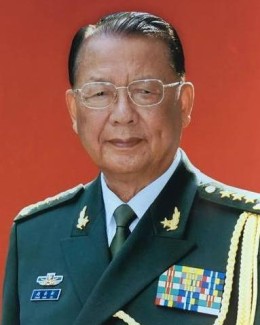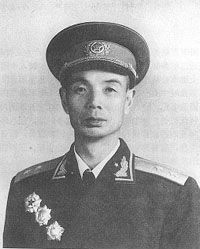
The Chinese Communist Party (CCP), officially the Communist Party of China (CPC), is the founding and sole ruling party of the People's Republic of China (PRC). Under the leadership of Mao Zedong, the CCP emerged victorious in the Chinese Civil War against the Kuomintang. In 1949, Mao proclaimed the establishment of the People's Republic of China. Since then, the CCP has governed China and has had sole control over the People's Liberation Army (PLA). Successive leaders of the CCP have added their own theories to the party's constitution, which outlines the party's ideology, collectively referred to as socialism with Chinese characteristics. As of 2023, the CCP has more than 98 million members, making it the second largest political party by membership in the world after India's Bharatiya Janata Party.

The Politburo Standing Committee (PSC), officially the Standing Committee of the Political Bureau of the Central Committee of the Communist Party of China, is a committee consisting of the top leadership of the Chinese Communist Party (CCP). Historically it has been composed of five to eleven members, and currently has seven members. Its officially mandated purpose is to conduct policy discussions and make decisions on major issues when the Politburo, a larger decision-making body, is not in session. According to the party's constitution, the General Secretary of the Central Committee must also be a member of the Politburo Standing Committee.

The Secretariat, officially the Secretariat of the Central Committee of the Communist Party of China, is a body serving the Politburo and its Standing Committee. The secretariat is mainly responsible for carrying out routine operations of the Politburo and coordinating organizations and stakeholders to achieve tasks set out by the Politburo. It is empowered by the Politburo to make routine day-to-day decisions on issues of concern in accordance with the decisions of the Politburo, but it must consult the Politburo on substantive matters. The de facto head of the Secretariat is the first-ranked secretary.

The National Congress of the Chinese Communist Party is a party congress that is held every five years. The National Congress is theoretically the highest body within the Chinese Communist Party (CCP). Since 1987 the National Congress has been held in the months of October or November. The venue for the event, beginning in 1956, is the Great Hall of the People in Beijing. The Congress is the public venue for top-level leadership changes in the CCP and the formal event for changes to the Party's Constitution. In the past two decades the National Congress of the CCP has been pivotal at least as a symbolic part of leadership changes, and therefore has gained international media attention.

The Swiss Party of Labour is a communist party in Switzerland. It is associated with the European United Left–Nordic Green Left group in the European Parliament, although Switzerland is not in the EU.

The All-China Federation of Trade Unions (ACFTU) is the national trade union center and people's organization of the People's Republic of China. It is the largest trade union in the world with 302 million members in 1,713,000 primary trade union organizations. The ACFTU is divided into 31 regional federations and 10 national industrial unions. The ACFTU is the country's sole legally mandated trade union, with which all enterprise-level trade unions must be affiliated. There has been dispute over whether ACFTU is an independent trade union or even a trade union at all. It directs a public college, the China University of Labor Relations.
5th Congress may refer to:

Zhao Nanqi, or Cho Nam-gi (Korean: 조남기), was a three star General of the People's Republic of China and Vice Chairman of the Chinese People's Political Consultative Conference from 1998 to 2003, and Vice-chairman of the 5th National People's Congress.
The 5th Politburo, formally the Political Bureau of the 5th Central Committee of the Communist Party of China, was elected by the 1st Plenary Session of the 5th Central Committee in 1927, in the aftermath of the 5th National Congress of the Chinese Communist Party (CCP). This electoral term was preceded by the 4th Central Bureau and succeeded by the 6th Politburo in 1928.
The 6th Central Committee of the Chinese Communist Party was in session from 1928 to 1945, during most of the Chinese Civil War, and during the Second Sino-Japanese War. It held seven plenary sessions in this period. It was formally preceded by the 5th Central Committee of the Chinese Communist Party. It was the first central committee to have Mao Zedong as a high-ranking member. It was succeeded by the 7th Central Committee.
The 5th Central Committee of the Chinese Communist Party was in session from 1927 to 1928. It was set into motion by the 5th National Congress. It was followed by the 6th Central Committee of the Chinese Communist Party.
The 4th Central Executive Committee of the Chinese Communist Party was in session from 1925 to 1927, and was the last central committee to have the term 'executive' in its title. It was set into motion by the 4th National Congress of the Chinese Communist Party. This would be followed by the 5th Central Committee of the Chinese Communist Party.
The 2nd Central Executive Committee, officially the 2nd Central Executive Committee of the Communist Party of China, was elected by the 2nd National Congress and its electoral term started in 1922 and ended in 1923. This was the first form of a central committee organ elected by the CCP. Still, modern sessions of the Central Committee of the Chinese Communist Party are, by custom, numbered according to the session of the National Congress at which they are elected.

Lu Dingyi was a leader of the Chinese Communist Party. After the establishment of the People's Republic of China and before the Cultural Revolution, he was credited as one of the top officials in socialist culture.

The Communist Youth League of China (CYLC), also known as the Young Communist League of China or simply the Communist Youth League (CYL), is a people's organization of the People's Republic of China for youth between the ages of 14 and 28, run by the Chinese Communist Party (CCP). The league is organized on the party pattern. Its leader is its First Secretary, who is an alternate member of the Central Committee of the CCP. The incumbent First Secretary is A Dong, appointed in May 2023. The Communist Youth League is also responsible for guiding the activities of the Young Pioneers.

The president of the People's Republic of China, commonly called the president of China, is the state representative of the People's Republic of China. The presidency is a part of the system of people's congress based on the principle of unified power in which the National People's Congress (NPC) functions as the only branch of government and as the highest state organ of power. The presidency is a state organ of the NPC and equivalent to, for instance, the State Council and the National Supervisory Commission, rather than a political office, unlike the premier of the State Council. The president can engage in state affairs and receive foreign diplomatic envoys on behalf of China, but to perform other heads of state functions, the president needs the consent of the NPC or the NPC Standing Committee. While the presidency is not a powerful organ in itself, since 27 March 1993, the president has concurrently served as general secretary of the Central Committee of the Chinese Communist Party (CCP) and chairman of the Central Military Commission, making the incumbent China's paramount leader and supreme commander of the armed forces.
Huo Shilian was a People's Republic of China politician. He was born in Shanxi Province. He was Minister of Agriculture from February 1979 to March 1981. He was Chinese Communist Party (CCP) Committee Secretary of Shanxi (1980–1983) and Shaanxi (1965–1967). He was governor of Zhejiang. He was CCP Committee Secretary and Chairmen of Ningxia (1977–1979). He was a member of the 11th Central Committee of the Chinese Communist Party, 12th Central Committee of the Chinese Communist Party and the Central Advisory Commission. He was a delegate to the 1st National People's Congress, 2nd National People's Congress, 3rd National People's Congress, 4th National People's Congress and 5th National People's Congress. He was President of Zhejiang University (1953-1958). He left the public eye in 1987. He died in Beijing at the age of 87.

Cheng Zihua was a People's Republic of China politician and military general. He was born in Yuncheng, Shanxi Province. He was the 1st Chinese Communist Party Committee Secretary and governor of his home province. He was a delegate to the 3rd (1964-1975), 4th (1975-1978) and 5th (1978-1983) National People's Congress. Cheng was an important part of the Third Front campaign to develop basic and national defense industry in China's interior.

Zhang Dazhi was a Chinese military officer and politician, lieutenant general of the People's Liberation Army. He served, most notably, as Commander of the Lanzhou Military Region from 1955 to 1969, and Commander of the PLA Artillery Forces from 1969 to 1977.

The 4th National Congress of the Chinese Communist Party was held in the Shanghai International Settlement at a shikumen residence in No. 8, Lane 256, Dongbaoxing Road, between 11 and 22 January 1925. The congress was attended by 20 participants representing 994 party members of the Chinese Communist Party (CCP). The congress succeeded the 3rd National Congress of the Chinese Communist Party and preceded the 5th National Congress of the Chinese Communist Party. A congress report was drafted by Chen Duxiu who represented the 3rd Central Executive Committee of the Chinese Communist Party.











